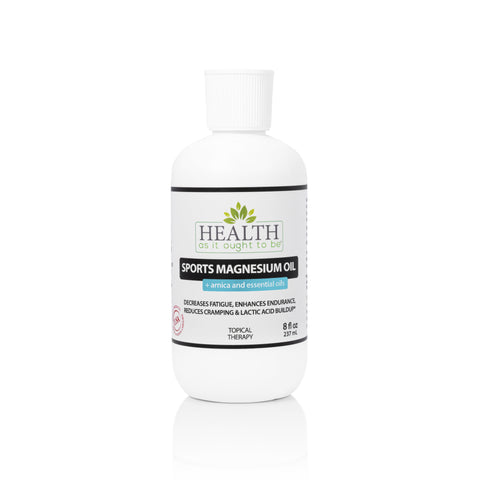
How Magnesium Chloride Can Help You Recover From Exercise Quicker
When my patients want to know what I recommend as one of the top ways to experience Health As It Ought To Be, I always tell them to exercise.
Some of them are relieved to hear this because they're already working out.
Others realize exercise is missing in their lives and they really should start.
Those patients are the ones who are subjected to one of my patented "patronizing doctor stares," some quick scribbling on my chart (we don't use charts in my office) and a constant shaking of my head and rolling of my eyes.
I'm kidding of course.
Instead I work with them to see what can be done to get them exercising for better health.
Now regardless of which camp my patients find themselves in, one of the top complaints I hear is exercise is a pain... an actual pain.
Some people avoid exercise because it hurts so bad, and others don't workout often enough because they're always sore and stiff.
Now I'll admit some pain is a natural side effect of exercise, but in many cases the reasons people feel so cruddy after they workout is because of major deficiencies in one of the most important minerals needed for healthy function.
I'm talking about magnesium. Magnesium is one of the most important minerals for human health and most people are deficient in it because of dietary and environmental factors.
I've written about the health benefits of magnesium several times, mentioning it's essential in 300 enzymatic processes in your body. However, I've never focused on its effects on athletes (or people who want to stay healthy through exercise).
The good news is that ends today!
Discover Why Magnesium Chloride Can Help You Recover From Exercise Quicker
As long as you're on this earth fighting gravity, exercise will do certain things to your body - mainly fatigue it and cause it to breakdown (it's built back up through rest and proper eating habits).
Now when you combine that consideration with the truth most Americans are deficient in magnesium, it creates a series of serious problems - one of the most notable being the inability to properly detox, as well as continual soreness in athletes.
Research shows even a small deficiency can hinder athletic performance (1)
Magnesium is involved in numerous processes that affect muscle function including oxygen uptake, energy production and electrolyte balance. Thus, the relationship between magnesium status and exercise has received significant research attention. This research has shown that exercise induces a redistribution of magnesium in the body to accommodate metabolic needs.
There is evidence that marginal magnesium deficiency impairs exercise performance and amplifies the negative consequences of strenuous exercise (e.g., oxidative stress). Strenuous exercise apparently increases urinary and sweat losses that may increase magnesium requirements by 10-20%. Based on dietary surveys and recent human experiments, a magnesium intake less than 260 mg/day for male and 220 mg/day for female athletes may result in a magnesium-deficient status. Recent surveys also indicate that a significant number of individuals routinely have magnesium intakes that may result in a deficient status.
When you consider people are magnesium deficient to begin with, and sweating heavily causes you to excrete magnesium (it's found in your sweat), you're setting yourself up for a double whammy.
Your body doesn't fare well when it's missing out on magnesium. Without enough magnesium, your body needs more oxygen to get the same amount of work done. It increases your heart rate, as magnesium is needed for powerful heart contractions, and it reduces your metabolic efficiency.
All of this snowballs and makes it so you're wiped out after a workout. Because magnesium also plays a role in cellular regeneration and detoxification, a deficiency also makes it harder to recover.
That's why it's incredibly important to do everything you can to maintain proper magnesium levels in your body.
One of the easiest ways to do this is via diet/supplementation.
You likely know at Health As It Ought To Be we treat food as a source of medicine, so consider this my first recommendation: do all you can to eat your way to attain optimal levels of magnesium.
Some of the best foods you can eat to help achieve ideal levels of magnesium (that are in line with a gluten-free, dairy-free, soy-free diet) are as follows:
(Men RDA 400 milligrams and Women RDA 310 milligrams a day)
I do need to caution you on something, though: the list you saw above is assuming all of the foods you eat are nutritionally superior.
It can actually be quite difficult to get all the magnesium you need from diet alone because of environmental degradation of our food supply.
Yeah, it's a bummer to think food isn't as nutritious as it's supposed to be...but it's the way of life in an era of the modern grocery store.
Another option is supplementing with magnesium orally. There are all kinds of magnesium supplements out there, and I definitely recommend taking one - but I'm not going to focus on those today.
For the sake of this article, I want to talk about a specific supplemental form of magnesium you might not know exists. This form of magnesium is topical, and when rubbed on the skin it can penetrate deep to help boost magnesium levels locally.
This has shown to be a promising treatment for helping eradicate site-specific soreness and fatigue associated with exercise.
Discover How Magnesium Chloride Oil Can Help Reduce Soreness
If you've ever worked out so hard you had to grab some BENGAY or Tiger Balm to relieve your sore muscles, then you're familiar with the concept of topical analgesics for pain relief.
Magnesium chloride works in a similar fashion, although it's not a pain reliever in the pharmaceutical sense.
When you apply this form of magnesium to your body, what you're doing is introducing positively charged ions of magnesium chloride directly into your body through your skin.
These ions can then fasten to the cells and help relieve the body from accumulating toxins, while thereby helps decrease the stress/fatigue associated with exercise.
Dr. Mark Sircus, who's a renowned expert on the effects of magnesium in the body, writes this about what happens when you introduce magnesium chloride into the body transdermally:
Ultimately what happens in your body with an infusion of magnesium chloride is your body detoxes more efficiently, it transports oxygen more efficiently as red blood cell profiles are improved, and your cells become healthier and better suited for energy transference (along with a host of other obvious benefits).
Remember - magnesium is essential in over 300 essential enzymatic processes in your body, which means when you get it straight into the muscle and blood stream you're helping boost your body's ability to fight things like inflammation from over exertion, general toxicity, and fatigue.
Conservative estimates show anywhere from 70-80% of Americans are deficient in magnesium, so it makes sense to supplement with it.
We recently introduced our own line of topical magnesium chloride oil.
It contains 100% pure magnesium chloride, along with a handful of healing herbs.*
When applied to areas of the body that are sore and fatigued, we believe it can help you recover faster, workout longer and feel better overall.**
If you exercise (or are thinking about starting an exercise regimen) and would like to experience reduced pain, then I suggest getting a bottle or two today.
Click here or on the image below to get your own magnesium chloride today.
Talk soon,
Dr. Wiggy
www.HealthAsItOughtToBe.com
1 Nielsen, F.H., Lukaski, H.C. 2006. Update on the relationship between magnesium and exercise. Magnesium Research. 19(3): 180-189. Technical Abstract:
* This product contains no alcohol, aluminum, artificial fragrances or preservatives
** This product is not intended to diagnose, treat, cure or prevent disease. Do not ingest.




